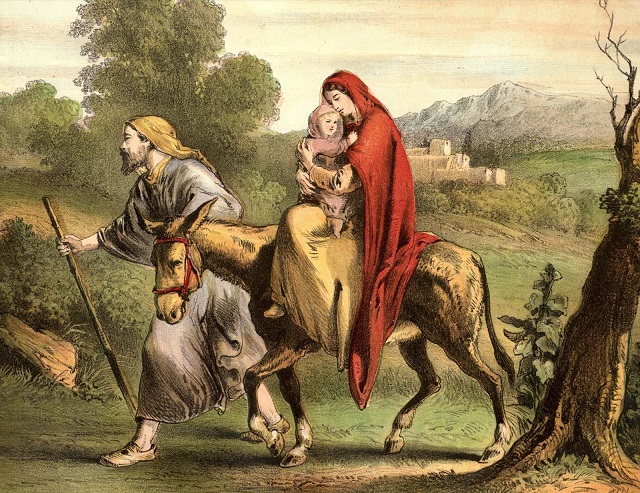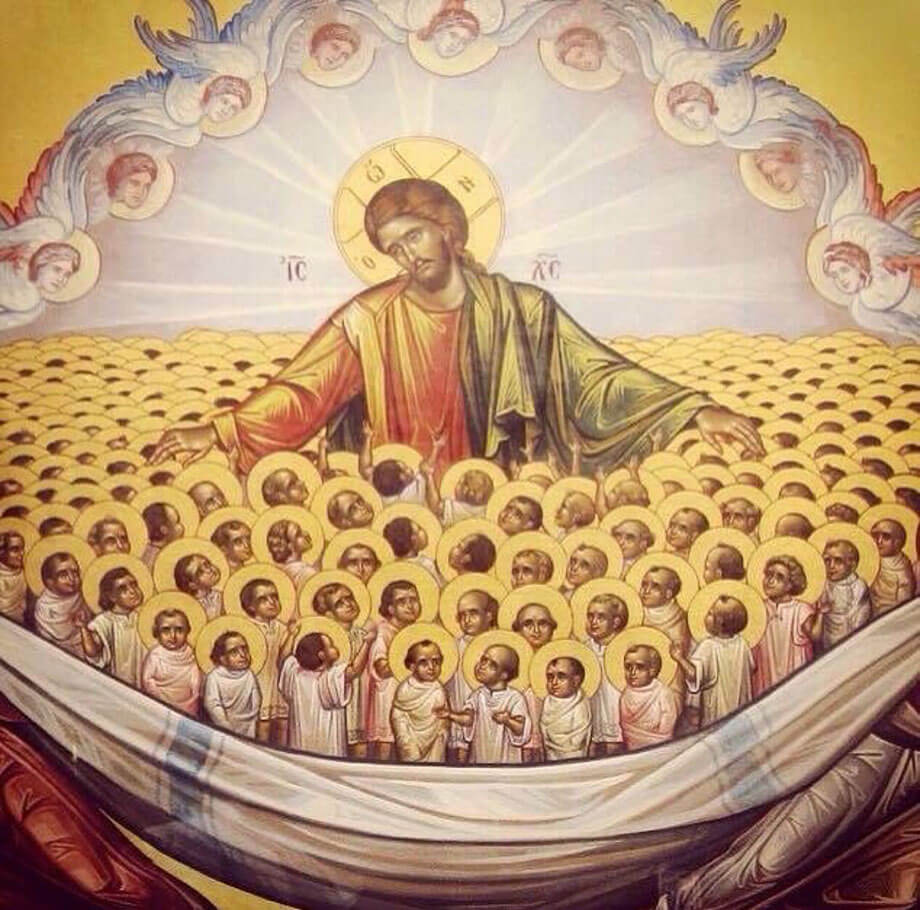Text: Matthew 2:13-23
The life of Christ has a twofold purpose. First and foremost, it is substitutionary. Everything that He did and suffered happened in our place, for our own good. As a result, we are saved from our sins, reconciled to God, and have true righteousness before God. We are saved by God’s grace and receive His salvation in faith.

Now that we are justified by faith and have peace with God, Christ’s life also serves as an example for us. This does not mean that we merely do as Jesus does in holy living—simply a moralistic What Would Jesus Do?—but we also follow Him in cross and suffering. Everything we suffer results in steadfast faith in Christ as we bear the cross. This is what St. Paul means when He says in Romans 5, “Not only that, but we rejoice in our sufferings, knowing that suffering produces endurance, 4 and endurance produces character, and character produces hope, 5 and hope does not put us to shame, because God’s love has been poured into our hearts through the Holy Spirit who has been given to us.” As contrary to reason as this may be, God brings all suffering to a wonderful, glorious outcome.
The life of Christ is substitutionary, and it is our example. It is this side of our life in Christ that we consider today as we hear of our Lord’s flight to and from Egypt as well as the slaughter of the Innocents in Bethlehem.
What seems to be more bad news this week actually shows how life as a Christian plays out among us. Mary and Joseph had to flee to Egypt because King Herod became paranoid that his throne was in jeopardy from an interloper Who was called the King of the Jews. Our Lord’s journey to Egypt was an arduous trip. His life was in danger. It was a long trip. Look at a map of that part of the world and you’ll see that it was at the least 75km (45 miles) to get from Bethlehem to Egyptian territory. There were no airplanes, no trains, no automobiles. The family had to stay in Egypt more than just a few days. They had to wait out Herod for almost a year. When Herod the Great died, an equally evil leader took his place. The family moved back to Nazareth in Galilee to avoid another bloodthirsty leader, and that was 145 km (90 miles) further.

The only-begotten Son of our heavenly Father deserves better than these humble accommodations. He shouldn’t have to flee cities and countries because of a mortal king worried about his earthly throne. Yet Jesus is, as Isaiah prophesied, a man of sorrows, and acquainted with grief [Isa 53:3]. What greater grief to be acquainted with than the death of many innocent children in the search for the Christ Child. Everything seemed destroyed. The joy of Christmas is soaked with blood and humiliation.
That’s the way it is this side of eternity. Consider the great heroes of the Old Testament. They did not walk an easy road to where God wanted them to go. Joseph suffered greatly in prison before becoming the second most powerful man in Egypt [Genesis 39-41]. Moses fled the Israelites before meeting the Lord in a burning bush and returning to his own to lead them out of Egypt and toward the Promised Land [Exodus 1-6]. King David, after he was anointed King of Israel, had to flee from King Saul as an outlaw [1 Samuel 16, 18-31]. The three young men in Babylon were thrown into a fiery furnace for confessing the true God [Daniel 3]. Daniel was thrown in a lion’s den for praying against an unrighteous law [Daniel 6]. Even Saint Paul had to be shown how much he had to suffer for the sake of Christ’s name [Acts 9:16; 2 Cor. 11:23-30].
Christian suffering continues today. Instead of everything becoming easier now that Jesus is born, things only seem to get worse. Misfortune is only beginning. As it was with Jesus, so it is with us. Just when we think things should get easier, life becomes more difficult. Where there was once honor, now there is ridicule and shame. Where there was blessing in your vocation, now everything goes against you. Where there was good health, now you have more illness. Where there was once happiness in your family, now there are painful deaths and separations, wayward children, poverty, and debt. It should not surprise us when we meet sudden disaster, untimely loss, and unfair treatment. That’s because in all suffering, God is making you similar to the suffering image of His Son.

There is a silver lining to these dark clouds. Almighty God protected Mary, Joseph, and the little Child Jesus on their journeys to and from Egypt. Three prophecies are fulfilled in today’s Gospel:
“Out of Egypt I called my son.” (Hos. 11:1)
18 “A voice was heard in Ramah,
weeping and loud lamentation,
Rachel weeping for her children;
she refused to be comforted, because they are no more.” (Jer. 31:15)
“…He would be called a Nazarene.” [Isa. 9:1]
These are reliable, yet true indicators that Jesus is the promised Messiah. The blood of the innocent children that died at Herod’s hands confesses that Jesus is the Christ, the Son of God. Their death spares them from all kinds of grief in this life, yet gives them blessed rest as they wait for the return of Messiah to raise the faithful departed.
As God led the innocent children out of this vale of tears, so He will do the same for you. He saves you through the perfect life and all-sufficient death of His Son Jesus. His Word is certain and precious above all things, just as Saint Paul says in Romans chapter eight: “I consider that the sufferings of this present time are not worth comparing with the glory that is to be revealed to us.” (Rom. 8:18)

We have a glimpse of this future glory that awaits us here in the Divine Service. Here we rest in Jesus Christ as He forgives our sins and strengthens our faith in preaching and the Sacrament. When we leave His presence here, we live In His grace as we turn away from worldly things and live in self-denial, patience, and prayer. There is an end of every cross, and it comes in God’s good time. We confess our faith in God, the Father Almighty, who created and still rules everything in heaven and earth [Rom. 8:38-39; Heb. 1:3]. Everything that we suffer strengthens our faith, which is that union we have with Jesus Christ. Consider those Old Testament saints mentioned a bit ago. There was an end to their suffering and an ultimate end to their lives. Yet the end of their pilgrimage on this earth wasn’t their final end. It was only the beginning. They sleep in peace, awaiting the return of Jesus to raise them from the dead.
So it is with us and all the faithful ones. We are the Church on earth, waiting in hope. We wait in the promise that all crosses have an end in Jesus Christ. He is well acquainted with suffering. He knows what it is like to walk the lonely way, a more lonely way than we’ll ever walk. He Himself has walked it, and as our Lord and God, He knows how to strengthen us to follow Him. We see in His earthly life assurance of how our Almighty Father will also care for and protect us from every evil of body and soul, possessions and reputation, and bring us safely out of this valley of sorrows to Himself. So, we cling to God the Father and our Savior Jesus Christ above all things, believing that patient endurance brings everlasting hope. Amen.




